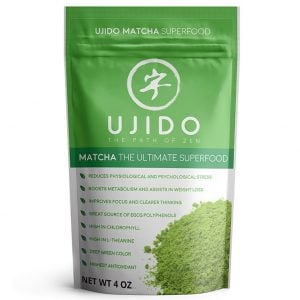Green tea makes you younger? Separating fact from fiction
We all know that drinking green tea is good for our bodies and our overall wellbeing. It’s an age-old ritual to aid digestion and help fight disease. But did you know that drinking green tea might be a tool to combat aging?
Why drink green tea? It has anti-aging benefits aplenty
Green tea has many proven health benefits, but research continues to support that the antioxidants in green tea may also slow aging by protecting against oxidative damage in the cells. Delicious and nutritious Ujido Matcha Green Tea contains 137 times more antioxidants than ordinary green tea.
Research from China shows people who drink tea regularly may have biologically younger cells than non-tea drinkers.1
Here’s how it works:
- As our cells replicate and age, the DNA sequences at the end of chromosomes, called telomeres, shorten.
- But the “antioxidative properties of tea and its constituent nutrients may protect telomeres from oxidative damage in the normal aging process,” according to the study.
- Water-extractable polyphenols that exist in tea are the powerful antioxidants that hunt down free radicals in your body.
- In tea, these polyphenols exist as a series of chemicals called catechins. Catechins hold all the potent antioxidant and disease-fighting properties.
- There are five different types of catechins, but the mightiest of all is epigallocatechin gallate, or EGCg for short.
- Even more encouraging is that the average difference in the telomere length between tea drinkers and non-tea drinkers corresponds to “approximately a difference of 5 years of life,” according to the researchers.
Just years before, Dr. Stephen Hsu, a cell biologist in the Medical College of Georgia Department of Oral Biology, was one researcher who contributed to these exciting discoveries about green tea. Dr. Hsu was credited for helping to determine that the polyphenols in green tea may neutralize free radicals, known to damage DNA and open the door to disease.
When Dr. Hsu and his colleagues examined the most abundant polyphenol in green tea — EGCg, mentioned above — they discovered that EGCg had a powerful effect on the skin. Specifically, the research team confirmed that EGCg could help to reactivate dying skin cells at the surface.2
When it comes to the beauty and the health of the skin, Dr. Hsu’s findings were profound.
Dr. Hsu suggested that green tea’s rejuvenating effect could help to soothe chronic skin conditions like rosacea and psoriasis, while improving aging and wrinkled skin.
Green tea versus black tea: Which is better?
Though both black tea and green tea were included in the original Chinese study, it’s important to note that most of the participants drank green tea, which contains between 30 and 40 percent water-extractable polyphenols. Black tea (which is simply green tea that has been oxidized by fermentation) only contains between 3 and 10 percent.
Black tea, ginkgo biloba leaves, dark chocolate, and wine all have catechins, but green tea has them all beat.
Nothing has as many free-radical-fighting catechins as green tea. You’d have to eat many bars of chocolate or drink a lot of wine to catch up. And all that excess chocolate and alcohol are certainly not recommended in your Body Ecology lifestyle and would be no good for your health in the long run.
For thousands of years, people have been drinking tea on a daily basis to pursue vitality. Now that research shows how green tea may actually help decrease the biological age of your cells, you’ll surely want to drink even more of this healthy, delicious, youth-giving beverage.
When choosing your daily pick-me-up drink, antioxidant content (needed to fight off the free radical damage that causes premature aging and disease) matters.
With 137 times more antioxidants than ordinary green tea, Ujido Matcha Green Tea may be an “anti-aging elixir” — with the potential to help support energy and detoxification, nourish the brain, balance mood and weight, and increase concentration.
6 more ways green tea could turn back time
If you’re looking for one good reason to drink green tea (including matcha) each day, we’ll give you six. While there is no “quick fix” to achieve youth and longevity, green tea’s ability to help improve health inside and out makes it a powerful anti-aging drink.
Here’s what the research has to say about our beloved brew:
1. Brain: If you too fear cognitive decline so often associated with age, this research will come as welcome news. In 2014, University of Basel scientists discovered that green tea extract could enhance cognitive function and especially working memory, with potential application for dementia treatment.3
2. Digestion: Healthy digestion is at the cornerstone of a long and full life, which may make green tea your new best friend. To regulate digestion, calm digestive troubles, and especially remedy SIBO (small intestinal bacterial overgrowth), green tea can help. Drinking green tea can decrease stool pH to support healthy bacterial growth, while decreasing the amount of bad bacteria in the gut.4
3. Joints: Creaking and aching joints may not be an inevitable part of aging, if you cultivate a daily green tea habit. The superstar polyphenol EGCg, along with EGC, could help to reduce knee pain and improve joint health.5
4. Skin: In addition to Dr. Hsu’s research, count this as yet another “plus” on green tea’s skin renewal list. A 2003 study published in Current Drug Targets – Immune, Endocrine & Metabolic Disorders confirmed that the photoprotective polyphenols in green tea could prevent skin damage caused by sun exposure, including photoaging.6
5. Weight: Metabolism is reported to slow with age, but drinking green tea or concentrated matcha may help beat the battle of the bulge. As we noted above, green tea can not only help to keep digestion moving, but it may slow weight gain with the potential to fight against obesity.7
6. Mortality: As if all the benefits listed above weren’t enough, drinking green tea may also extend length, as well as quality, of life. Researchers have observed green tea drinkers to have a lower risk of death from all causes, including cardiovascular disease.8 (Notably, a recent study found that green tea’s bioactive compounds — also in black and oolong teas — may provide potential antiviral protection against COVID-19.9)
With its many health advantages and powerful capacity to help fight the effects of age, green tea is one comforting drink that you can enjoy daily, without any guilt. A 2020 research review concluded that “green tea consumption overall may be considered beneficial for human health.”10
Ujido Matcha is our preferred green tea since it comes straight from the source. Made from the same green tea used in Japanese tea ceremonies, matcha is highly concentrated and highly nutritious. Matcha provides all the benefits of ordinary green tea and more and may be useful as a natural vitality booster.
REFERENCES:
- 1. Chan R, Woo J, Suen E, Leung J, Tang N. Chinese tea consumption is associated with longer telomere length in elderly Chinese men. Journal of Nutrition, May 2001. 131(5):1449-1451.Br J Nutr. 2010 Jan;103(1):107-13. Epub 2009 Aug 12. Article.
- 2. Hsu, S. “Green Tea Polyphenols Induce Differentiation and Proliferation in Epidermal Keratinocytes.” Journal of Pharmacology and Experimental Therapeutics, 1 (2003): 29-34.
- 3. André Schmidt, Felix Hammann, Bettina Wölnerhanssen, Anne Christin Meyer-Gerspach, Jürgen Drewe, Christoph Beglinger, Stefan Borgwardt. Green tea extract enhances parieto-frontal connectivity during working memory processing. Psychopharmacology, 2014; DOI: 10.1007/s00213-014-3526-1.
- 4. Lee HC, Jenner AM, Low CS, Lee YK. Effect of tea phenolics and their aromatic fecal bacterial metabolites on intestinal microbiota. Res Microbiol. 2006 Nov;157(9):876-84. doi: 10.1016/j.resmic.2006.07.004. Epub 2006 Aug 18. PMID: 16962743.
- 5. Adcocks, C., Collin, P., Buttle, D. J. Catechins from green tea (Camellia sinensis) inhibit bovine and human cartilage proteoglycan and type II collagen degradation in vitro. Journal of Nutrition, 2002 Mar;132(3):341-346.
- 6. Curr Drug Targets Immune Endocr Metabol Disord. 2003 Sep;3(3):234-42.
- 7. Huang, J., Wang, Y., Xie, Z. et al. The anti-obesity effects of green tea in human intervention and basic molecular studies. Eur J Clin Nutr 68, 1075–1087 (2014). https://doi.org/10.1038/ejcn.2014.143.
- 8. Kuriyama S, Shimazu T, Ohmori K, Kikuchi N, Nakaya N, Nishino Y, Tsubono Y, Tsuji I. Green tea consumption and mortality due to cardiovascular disease, cancer, and all causes in Japan: the Ohsaki study. JAMA. 2006 Sep 13;296(10):1255-65. doi: 10.1001/jama.296.10.1255. PMID: 16968850.
- 9. bioRxiv preprint server. Ohgitani E. 2020. Significant inactivation of SARS-CoV-2 by a green tea catechin, a catechin-derivative, and galloylated theaflavins in vitro. https://www.biorxiv.org/content/10.1101/2020.12.04.412098v1.
- 10. Abe, S.K., Inoue, M. Green tea and cancer and cardiometabolic diseases: a review of the current epidemiological evidence. Eur J Clin Nutr (2020). https://doi.org/10.1038/s41430-020-00710-7.









